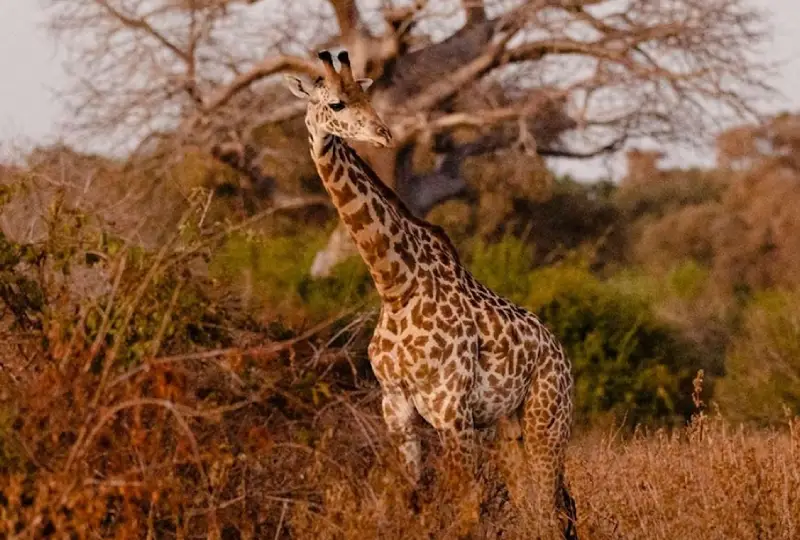Ruaha National Park Overview
Ruaha National Park is Tanzania’s largest national park and one of Africa’s greatest wilderness destinations. Covering more than 20,000 square kilometers, the park forms part of a vast ecosystem that includes the Rungwa Game Reserve and other protected areas, making it one of the most important conservation landscapes on the continent. Despite its size and richness, Ruaha receives far fewer visitors than Serengeti or Ngorongoro, which makes it one of Tanzania’s best kept safari secrets.
The park is named after the Great Ruaha River, which flows along its southeastern border. This river is the lifeblood of the park, attracting an astonishing variety of wildlife, particularly during the dry season when animals congregate along its banks. Ruaha is famous for its impressive elephant population, large prides of lions, and thriving populations of African wild dogs. The park also boasts more than 570 bird species, making it a paradise for birdwatchers. Its rugged landscapes ranging from rolling hills and baobab studded plains to river valleys provide a dramatic backdrop for an unforgettable safari.
Where is Ruaha National Park located?
Ruaha National Park lies in central Tanzania, about 625 kilometers west of Dar es Salaam. It is also accessible from Iringa, a town located roughly 130 kilometers away. Its remote location contributes to its exclusivity, ensuring a safari experience far from the crowds. Travelers can reach the park by scheduled flights from Dar es Salaam, Arusha, or Zanzibar, or by road through Iringa, which takes around four to five hours.
What makes Ruaha National Park unique?
Ruaha stands out because of its wild, untamed atmosphere and its exceptional predator populations. It is one of the few parks in Africa where visitors can witness very large prides of lions, sometimes numbering more than 20 individuals. The park is also renowned for its African wild dogs, a rare and endangered species that thrives here in one of the largest populations on the continent. Beyond predators, Ruaha is celebrated for its baobab trees that dot the landscape, creating an iconic African scenery. Unlike the busier northern circuit parks, Ruaha offers seclusion, authenticity, and the feeling of being in untouched wilderness.
What animals can be seen in Ruaha National Park?
Ruaha is home to an extraordinary range of wildlife. Visitors can see vast herds of elephants, buffalo, and antelope species such as greater and lesser kudu, sable, and roan antelope. Predators are well represented, with lions, leopards, cheetahs, spotted hyenas, and African wild dogs regularly sighted. The river attracts hippos and crocodiles, while the surrounding savannah is alive with giraffes, zebras, and wildebeests. With over 570 bird species, including endemics and migratory species, Ruaha is also considered a premier birdwatching destination in East Africa.
When is the best time to visit Ruaha National Park?
The best time to visit Ruaha is during the dry season, from June to October. During these months, the Great Ruaha River becomes the main source of water, drawing animals in large numbers and offering spectacular game viewing. The vegetation is also thinner, making it easier to spot wildlife. The wet season, from November to May, transforms the park into lush green landscapes, and while game viewing is more challenging due to thicker vegetation, it is a rewarding time for birdwatchers and those seeking a quieter safari.
How can travelers access Ruaha National Park?
There are two main ways to reach Ruaha. The fastest and most convenient is by air, with daily flights from Dar es Salaam, Zanzibar, and Arusha landing at airstrips inside the park. For those who prefer traveling by road, the journey from Iringa town takes about four to five hours. While road travel can be adventurous, it is often combined with stops at nearby attractions, making it an ideal option for travelers who enjoy overland journeys.
What safari activities are offered in Ruaha National Park?
Ruaha offers a variety of safari activities that showcase its wilderness from different perspectives. Game drives are the most popular, providing opportunities to explore the park’s diverse habitats and encounter its abundant wildlife. Walking safaris, led by experienced guides, give visitors a deeper connection to the land by focusing on tracks, plants, and smaller creatures often overlooked during drives. Night game drives are available in some areas, revealing nocturnal animals such as bush babies and civets. Birdwatching safaris are another highlight, with enthusiasts often spotting dozens of species in a single day.
Where can travelers stay in Ruaha National Park?
Accommodation in Ruaha ranges from luxury lodges to intimate tented camps and simple campsites. Many lodges are positioned along the Great Ruaha River, offering breathtaking views of animals coming to drink. Lodges such as Jabali Ridge, Ruaha River Lodge, and Ikuka Safari Camp provide high-end comfort, while smaller camps deliver a more rustic and close-to-nature experience. The variety ensures that both luxury seekers and budget travelers can find suitable options within the park.
How does Ruaha compare to other national parks in Tanzania?
Ruaha differs significantly from parks like Serengeti or Nyerere. Serengeti is best known for the Great Migration, while Ruaha excels in predator action and dramatic landscapes. Compared to Nyerere, which offers boat safaris and wetlands, Ruaha is more rugged and dominated by dry savannah and baobab forests. What makes Ruaha truly special is its sense of remoteness while other parks attract large numbers of tourists, Ruaha remains relatively untouched, allowing visitors to enjoy the wilderness in near solitude.
Is Ruaha National Park safe for visitors?
Yes, Ruaha is safe for visitors. Safari activities are conducted by professional guides and rangers who ensure that safety protocols are always followed. As with all wilderness areas, listening to guides, respecting park rules, and exercising caution during activities guarantees a safe and enjoyable safari experience.

